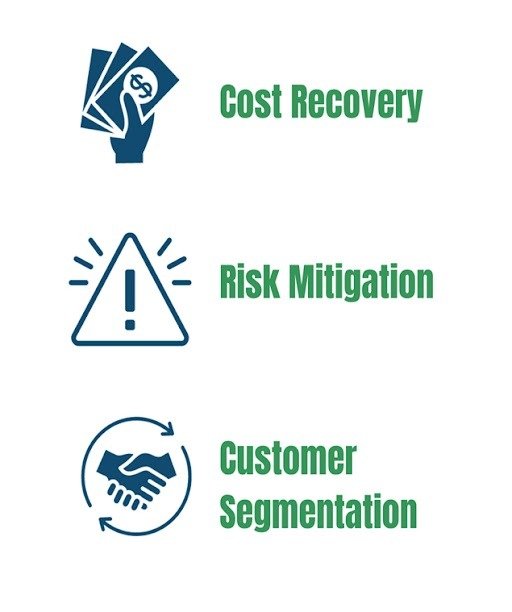In today's fast-paced world, managing your finances efficiently is paramount. Banks and other financial organizations in the UAE provide a variety of bank accounts to their customers, including savings, current, salary, fixed deposit accounts, and more. These bank accounts have certain restrictions that account users must meet, such as a minimum balance, income, deposit, and more. According to the chosen type of account conditions, account holders must maintain a minimum balance. Banks can assess fees on bank accounts that do not fulfil the minimum monthly requirements. This blog will give detailed information on the Penalty- Maintenance of a Minimum Balance in a Bank Account. Failure to adhere to this rule can result in a series of charges, often called "non-maintenance charges." In this post, we will explore the concept of non-maintenance charges, what they entail, and what happens if you don't maintain the minimum balance in your bank account.
Understanding Non-Maintenance Charges
Non-maintenance charges, or Minimum Balance Charges, are fees banks impose when an account holder fails to maintain the minimum required balance. The minimum balance requirement varies from one bank to another and can even differ for different account types within the same bank.
Key Concepts and Terms:
-
Minimum Balance Charges: These are the fees levied by banks for failing to maintain the required minimum balance in your account.
-
Non-Maintenance of Minimum Balance: Refers to the situation where an account holder falls short of maintaining the stipulated minimum balance.
-
What Happens if You Don't Maintain Minimum Balance: This section will discuss the consequences of not adhering to the minimum balance requirement.
Know Your Bank Charges
For most people, opening a savings account is a no-brainer. And, as processes become more automated and digitized, people tend to choose a savings account based only on the interest rate offered. However, it's also crucial to be aware of the various charges that banks may levy because, in most circumstances, a little foreknowledge may help you avoid these fees.
While the types and amounts of accounts differ in every bank, you should be aware of the most prevalent ones, some of the are:
Penalties for a Minimum Balance
Let's begin with the most obvious example. Most banks in the UAE, understandably, levy a monthly fee for non-maintenance of a savings account. A minimum balance is frequently required in savings accounts. If you cannot do so, your account may be subject to charges. If the account holder does not maintain the minimum balance as indicated, banks normally levy a monthly fee of AED 25 to AED 200. Each bank's minimum balance requirements may differ, so double-check.
Charges for Account Closure
Most banks charge consumers a fee if they close an account before a specified period. If you close your account during the first six months or a year in the UAE, many banks charge roughly AED 100.
Fees for Account Statements
A bank account statement must have a detailed picture of the account's transactions—however, most banks in the UAE charge between AED 25 and AED 30 for a monthly report.
Fees for Foreign Exchange
These fees are applied to purchases made with your credit card while travelling overseas or in a different currency. They usually range from 1% to 3% of the total transaction value. Visa or MasterCard will also charge you a conversion fee. If you travel frequently and are looking for a travel credit card, consider this cost before applying.
Charges for Transferring Cash Abroad
According to some financial experts, UAE expats who make regular foreign fund transfers, whether to meet financial obligations back home or for investment motives, can incur thousands of dirhams in penalties each year. The standard service fees alone can vary depending on the destination of the funds. For example, the cost of sending money to Asia might range from AED 7 to AED 22 for each transaction.
The fees indicated above may differ between banks and account types. So, when you choose a savings account, thoroughly review the schedule of relevant charges to ensure that your savings are protected. You can check the fees on the bank's website if you have an existing savings account.
Why Do Banks Apply Penalties?
Non-maintenance of a minimum account balance by account holders is penalized by UAE banks. There may be various reasons account users cannot maintain the minimum amount in their bank accounts. Financial difficulties or the need for emergency finances are among the factors. Maintaining a minimal amount can be difficult for account users who are financially strapped and barely make ends meet. On the other hand, account holders in need of emergency money may be forced to withdraw their minimal amount from their bank account to pay their financial obligations.
Why Do Banks Impose Minimum Balance Requirements?
Banks have several reasons for requiring customers to maintain a minimum balance in their accounts:

-
Cost Recovery: It helps banks cover the operational costs of maintaining and servicing accounts.
-
Risk Mitigation: Minimum balance requirements mitigate the risk associated with customers abandoning their accounts with low balances.
-
Customer Segmentation: Different account types are designed to cater to different customer segments. By imposing minimum balance requirements, banks can tailor their services to the specific needs of these segments.
What Happens If You Don't Maintain the Minimum Balance?
If you fail to maintain the minimum balance in your bank account, the following consequences may apply:
-
Non-Maintenance Charges: The primary result is that the bank will impose non-maintenance charges. These charges can vary significantly among banks and accumulate over time if the issue needs to be addressed promptly.
-
Reduced Interest Earnings: Some banks might reduce or eliminate the interest earned on your account if you consistently fail to meet the minimum balance requirement.
-
Account Closure: In extreme cases, if the version remains below the minimum balance for an extended period, the bank may choose to close the account.
-
Limited Access: You might have limited access to certain banking services or features, such as cheque books or debit cards.
How to Avoid Non-Maintenance Charges
Account holders who don't wish to keep a minimum balance in their bank accounts can open zero-balance savings accounts. You may already have a zero-balance savings account if you are a paid employee. These bank accounts are simple savings accounts set up by your employers to facilitate monthly salary transfers. You can use it for day-to-day transactions instead of a bank account with a monthly minimum balance requirement.
Aside from that, consider opening a simple bank account with a few extra features. These bank accounts have no minimum balance requirement (monthly and quarterly). Banks provide these accounts to encourage financial inclusion and assist persons from economically disadvantaged backgrounds in managing their finances better.
To avoid non-maintenance charges and their associated inconveniences, consider the following strategies:
-
Regularly Monitor Your Account: Monitor your account balance to ensure it remains above the minimum.
-
Automated Alerts: Many banks offer account balance alerts, which can notify you when your balance is getting close to the minimum requirement.
-
Choose the Right Account Type: Ensure you select an account type that matches your financial behaviour and ability to maintain the required balance.
-
Plan Your Expenses: Create a budget and financial plan to help manage your account balance effectively.
Conclusion
We hope this blog has given you a better understanding of why bank accounts are subject to penalties and how to avoid them. If you want to open a simple bank account, go to our website and browse under the bank accounts area to learn more about your possibilities. Non-maintenance charges for failing to maintain the minimum balance in your bank account can be an unwelcome financial burden. Understanding these charges and the implications of not meeting the minimum balance requirements is crucial for responsible financial management. You can avoid these charges and ensure a smooth banking experience by staying informed and proactive. Remember that reading and understanding your bank's terms and conditions is essential, and selecting the right account type that aligns with your financial habits and capabilities. You can also contact Dhanguard staff to learn more about the features and perks of your chosen bank accounts. Our financial specialists will assess your financial needs and recommend appropriate solutions. Still, they will also walk you through the account-opening procedure and ensure one is opened as soon as possible. Connect with Dhanguard for more references related to this topic.
DhanGuard: All-in-One Solution for Business Setup in Dubai, UAE
DhanGuard is your ultimate one-stop solution for all your business needs. Whether you’re planning to set up a new company or expand your existing business in the UAE, we’ve got you covered with our comprehensive range of services. From Business Setup in UAE and Company Formation in Dubai to managing your financial and legal compliance, we provide everything you need under one roof.
Our services include:
- Company Formation in UAE and Dubai
- Opening a Business Bank Account in UAE and Dubai with a 99% success rate
- VAT & Corporate Tax Compliance
- Accounting, Bookkeeping, and Auditing Services
- Trade License Renewal
- Golden Visa Assistance
Let DhanGuard make your journey of Business Setup in Dubai seamless and hassle-free!













